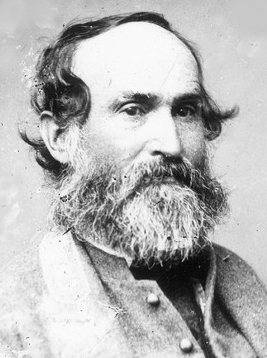Jubal Anderson Early
Jubal Anderson Early was born on November 3, 1816, in Franklin County, Virginia, to Joab Early and Ruth Stovall Hairston. His father was a planter and local politician who owned $20,000 of real estate by 1850. His mother died in 1832. He attended school in Lynchburg and Danville, Virginia, before receiving an appointment to the United States Military Academy in 1833.
Early graduated from the academy in 1837 and received a commission as a 2nd lieutenant in the 3rd United States Artillery. He served briefly in the Second Seminole War before resigning from the military in 1838. He then studied law, and he was admitted to the Virginia bar in 1840. He supported the Whig Party, and he served in the Virginia House of Delegates from 1841 until 1842.
He took part in the Mexican American War, receiving a commission as a major in the 1st Virginia Volunteers. He arrived in Mexico too late to witness combat, but he served on garrison duty and helped govern the town of Monterey. During the war, he also developed rheumatoid arthritis, which plagued him for the rest of his life. He returned to Franklin County, Virginia, after the war and resumed his work as a lawyer. He never married, but he engaged in a long relationship with Julia McNealey. The couple had four children: Joseph, born around 1851; Florence, born around 1859; Robert, born around 1861; and Jubal, born around 1864.
Early served as a Unionist delegate to the Virginia Secession Convention in 1861. He voted against secession on April 4 and again on April 17. After Virginia seceded, however, he sided with the Confederacy, and he received a commission as a brigadier general in the Virginia militia. In June 1861, he became the colonel of the 24th Virginia Infantry. He took part in many of the war’s major battles, including the First Battle of Manassas, the Seven Days’ Battles, the Second Battle of Manassas, the Battle of Antietam, the Battle of Fredericksburg, the Battle of Chancellorsville, the Battle of Gettysburg, the Overland Campaign, and the Shenandoah Valley campaign of 1864.
He was promoted to brigadier general in 1861 and to major general in January 1863, and he received a temporary promotion to lieutenant general in June 1864. He was wounded in the shoulder in the Battle of Williamsburg in May 1862, but he rejoined the army the following month. Union forces defeated him in the Battle of Waynesboro in March 1865. After the battle, General Robert E. Lee relived Early of command and instructed him to return home.
When the Confederacy collapsed in 1865, Early refused to swear an oath of allegiance to the Union. Instead, he fled to Mexico and eventually made his way to Canada. While he was there, he published A Memoir of the Last Year of the War for Independence, which was the first memoir by a leading Civil War general on either side.
He returned to the United States in 1869 and settled in Lynchburg, Virginia. He became a powerful advocate of the Lost Cause, and he spent the rest of his life defending the Confederacy in speeches, letters, and publications. He became president of the Southern Historical Society in 1873, and he also served as president of the Lee Monument Association and the Association of the Army of Northern Virginia. He died in Lynchburg on March 2, 1894, and he was buried in the town’s Spring Hill Cemetery.
Image: Jubal A. Early (courtesy Wikicommons)
DATABASE CONTENT
| (71) | Early, Jubal Anderson | 1816-11-03 | 1894-03-02 |
- Conflict Side: Confederacy
- Role: Soldier
- Rank in: Colonel
- Rank out: Major General
- Rank highest: Lieutenant General
- Gender: Male
- Race: White
Documents - Records: 6
- (918) [writer] ~ Jubal A. Early to John Letcher, 26 May 1861
- (1979) [writer] ~ Jubal A. Early to John Letcher, 26 May 1861
- (2843) [writer] ~ Jubal A. Early Special Order, 27 July 1861
- (4099) [writer] ~ Jubal A. Early to Fitzhugh Lee, 17 March 1872
- (4105) [writer] ~ Jubal A. Early to Charles C. Jones Jr., 7 March 1872
- (15255) [recipient] ~ Unknown to Jubal A. Early, 13 February 1865
Places - Records: 2
Regiments - Records: 2
Groups - Records: 1
- (2) [politician] ~ Whig Party
SOURCES
1850, 1860, and 1880 United States Federal Censuses, available from Ancestry.com;
“Jubal Early” Wikipedia profile, available from https://en.wikipedia.org/wiki/Jubal_Early; J. Tracy Power, “Jubal A. Early (1816-1894),” Encyclopedia Virginia, available from https://encyclopediavirginia.org/entries/early-jubal-a-1816-1894; Gary W. Gallagher, Becoming Confederates: Paths to a New National Loyalty (Athens, GA: University of Georgia Press, 2013)





